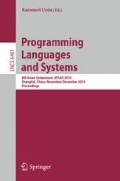Abstract
Descriptional composition is a method to fuse two term transformation algorithms described by attribute couplings (AC, attribute grammars over terms) into one. In this article, we provide a general categorical framework for the descriptional composition based on traced symmetric monoidal categories and the construction by Joyal et al. We demonstrate that this framework can handle the descriptional composition of SSUR-ACs, nondeterministic SSUR-ACs, quasi-SSUR ACs and quasi-SSUR stack ACs.
Access this chapter
Tax calculation will be finalised at checkout
Purchases are for personal use only
Preview
Unable to display preview. Download preview PDF.
References
Bartha, M.: Linear deterministic attributed transformations. Acta Cybern. 6, 125–147 (1983)
Blackwell, R., Kelly, G.M., Power, A.J.: Two-dimentional monad theory. Journal of pure and applied algebra 59, 1–41 (1989)
Boyland, J.: Conditional attribute grammars. ACM Trans. Program. Lang. Syst. 18(1), 73–108 (1996)
Chirica, L.M., Martin, D.F.: An order-algebraic definition of Knuthian semantics. Mathematical Systems Theory 13, 1–27 (1979)
Courcelle, B., Deransart, P.: Proofs of partial correctness for attribute grammars with applications to recursive procedures and logic programming. Inf. Comput. 78(1), 1–55 (1988)
Ganzinger, H.: Increasing modularity and language-independency in automatically generated compilers. Sci. Comput. Program. 3(3), 223–278 (1983)
Ganzinger, H., Giegerich, R.: Attribute coupled grammars. In: SIGPLAN Symposium on Compiler Construction 1984, pp. 157–170. ACM, New York (1984)
Giegerich, R.: Composition and evaluation of attribute coupled grammars. Acta Inf. 25(4), 355–423 (1988)
Hasegawa, M.: Models of Sharing Graphs: A Categorical Semantics of let and letrec. Springer, Heidelberg (1999)
Johnsson, T.: Attribute grammars as a functional programming paradigm. In: Kahn, G. (ed.) FPCA 1987. LNCS, vol. 274, pp. 154–173. Springer, Heidelberg (1987)
Joyal, A., Street, R., Verity, D.: Traced monoidal categories. Mathematical Proceedings of the Cambridge Philosophical Society 119(3), 447–468 (1996)
Katsumata, S.: Attribute grammars and categorical semantics. In: Aceto, L., Damgård, I., Goldberg, L.A., Halldórsson, M.M., Ingólfsdóttir, A., Walukiewicz, I. (eds.) ICALP 2008, Part II. LNCS, vol. 5126, pp. 271–282. Springer, Heidelberg (2008)
Katsumata, S., Nishimura, S.: Algebraic fusion of functions with an accumulating parameter and its improvement. In: Reppy, J.H., Lawall, J.L. (eds.) ICFP, pp. 227–238. ACM, New York (2006)
Knuth, D.E.: Semantics of context-free languages. Mathematical Systems Theory 2(2), 127–145 (1968)
Knuth, D.E.: Correction: Semantics of context-free languages. Mathematical Systems Theory 5(1), 95–96 (1971)
Kock, A.: Strong functors and monoidal monads. Archiv. der Math. 23(1), 113–120 (1972)
MacLane, S.: Categories for the Working Mathematician, 2nd edn. Graduate Texts in Mathematics, vol. 5. Springer, Heidelberg (1998)
Nakano, K.: Composing stack-attributed tree transducers. Theory Comput. Syst. 44(1), 1–38 (2009)
Nishimura, S.: Deforesting in accumulating parameters via type-directed transformations. In: APLAS 2002, pp. 145–159 (2002)
Nishimura, S., Nakano, K.: XML stream transformer generation through program composition and dependency analysis. Sci. Comput. Program. 54(2-3), 257–290 (2005)
Tanaka, M., Power, J.: Pseudo-distributive laws and axiomatics for variable binding. Higher-Order and Symbolic Computation 19(2-3), 305–337 (2006)
Voigtländer, J.: Using circular programs to deforest in accumulating parameters. Higher-Order and Symbolic Computation 17(1-2), 129–163 (2004)
Author information
Authors and Affiliations
Editor information
Editors and Affiliations
Rights and permissions
Copyright information
© 2010 Springer-Verlag Berlin Heidelberg
About this paper
Cite this paper
Katsumata, Sy. (2010). Categorical Descriptional Composition. In: Ueda, K. (eds) Programming Languages and Systems. APLAS 2010. Lecture Notes in Computer Science, vol 6461. Springer, Berlin, Heidelberg. https://doi.org/10.1007/978-3-642-17164-2_16
Download citation
DOI: https://doi.org/10.1007/978-3-642-17164-2_16
Publisher Name: Springer, Berlin, Heidelberg
Print ISBN: 978-3-642-17163-5
Online ISBN: 978-3-642-17164-2
eBook Packages: Computer ScienceComputer Science (R0)

